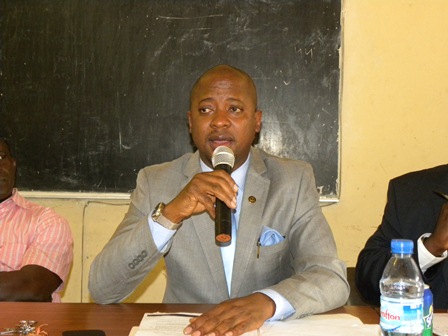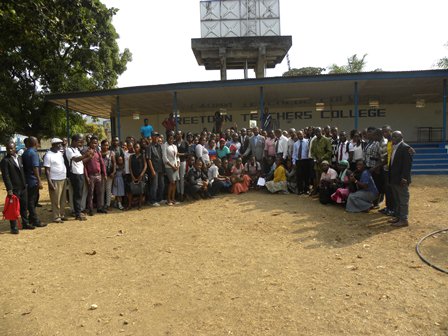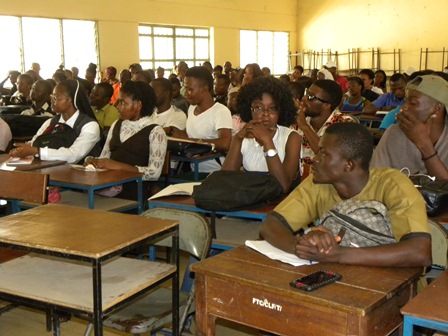OMBUDSMAN LECTURES FREETOWN TEACHERS COLLEGE ADMINISTRATION AND STUDENTS


The Ombudsman of the Republic of Sierra Leone Leon Jenkins-Johnston Esq. and team on Wednesday 30th January 2019 conducted a mini lecture for the Administration and Students of the Freetown Teachers College at Jui. The lecture is part of the ongoing sensitization to create awareness on the mandate and functions of the office of the Ombudsman.
Welcoming the Ombudsman and Team, the Principal, Freetown Teachers College Dr. Samba Moriba thanked the Ombudsman and Team for visiting them. He stated that the Office of the Ombudsman has serious responsibility in the fight against injustice and maladministration. He noted that the major role of the office of the Ombudsman is to bring justice and sanity to public life. He informed the gathering that the students are not only on campus to receive certificate but also to develop their working relationship with others and to serve as resource persons to talk about responsibility.
Making his presentation, the Ombudsman Leon Jenkins-Johnston Esq. said that the Office of the Ombudsman is a constitutionally created and it is spelt out in subsection 2 of section 146 of the constitution of Sierra Leone Act No. 6 of 1991. He further explained that the functions of the Office of Ombudsman are laid out in section 7 of the Ombudsman Act of 1997. He noted that Freetown Teachers College having being created by statute is under the watch of the Office. He stated that in the preamble of the Ombudsman’s act the FTC falls under section (b) of the title which states that:
“WHEREIN by subsection (2) of section 146 of the Constitution, it is provided that the functions of the Ombudsman shall “include the investigation of any action taken or omitted to be taken by or on behalf of – (b) any statutory corporation or institution of higher learning or education , set up entirely or partly out of public funds;
The Ombudsman noted that the Injustice as prescribed in the Ombudsman Acts Includes:
” includes hardship, detriment or grievance occasioned by any inequitable treatment, whether legally or otherwise;
He further describes Maladministration as:
- Bias;
- Unfair discrimination or failure to explain grounds of a decision which appears discriminatory;
- Harshness or general high-handedness;
- Misleading a member of the public as to high right or deliberately withholding from him material information concerning the rights of such person;
- Using powers for a wrong purpose;
- Failing to consider relevant material or taking irrelevant material into account for any decision;
- Losing or failing to reply to correspondence with a member of the public;
- Delaying unreasonably before making a tax refund or presenting a tax demand or dealing with any application for a grant or license.
For which the latter is not applicable to the institution. He revealed that under section 10 the Ombudsman has powers to investigate any complaints relating to a prescribed authority. He noted that under section 10(4) gives powers to the Ombudsman’s office to be transformed to a High Court or a judge when carrying out investigations.
He revealed that some of the complaints received from institutions ranged from delay in acting on complaints from students, bias, victimization sexual harassment from student to student and from students to lecturers.
He furthered that the office of the Ombudsman serves as an outlet for complaints. He noted that the office of the Ombudsman is closely monitoring the Free Quality Education program to ensure that the President Succeeds in its implementation.
The lecture was climaxed by a question and answer session.


